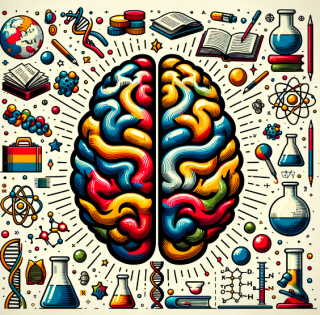Artificial Intelligence
AI as a Catalyst for Self-Actualization
The unique iterative process of LLMs may help you find your genius within.
Posted February 14, 2024 Reviewed by Ray Parker
Key points
- AI allows us to move beyond efficiency, sparking self-actualization and creativity.
- AI mirrors our intellect, deepening our engagement in a modern take on Socratic dialogues.
- These technologies kindle our cognitive abilities, boosting intellectual engagement and job satisfaction.
- Embracing AI invites exploration and joy, redefining our relationship with technology.

As we step into the cognitive age, we find ourselves at the confluence of a unique transformation, where the realms of artificial intelligence (AI) and large language models (LLMs) herald not merely an era of enhanced "thinking" capabilities but a significant opportunity for self-actualization. This narrative extends beyond the conventional accolades of efficiency and productivity, venturing into the more nuanced territories of human potential and joy.
Iteration, Cognitive Intimacy, and a Path to Self-Actualization
Across history, each age has been marked by distinct technological advancements that have fundamentally altered the human experience. As we transitioned from the industrial to the information age, our focus shifted from mechanical toil to the acquisition and manipulation of data. Today, we stand on the introduction of the cognitive age, defined not by the tasks we can outsource to machines but by how these cognitive technologies can amplify our innate capabilities, inviting us to kindle our creativity and perhaps even discover the "spark of genius" within each of us.
At the heart of this transformation lies the power of AI and LLMs to serve as mirrors reflecting our most intimate intellectual and creative potentials. Unlike their technological predecessors, these cognitive tools possess the unique capacity to engage with us in a deeply interactive and personal manner reminiscent of the ancient Socratic dialogues. However, rather than getting lost in the philosophical realms of ethics and morality, these modern dialogues are conducted in the vast expanse of our cognitive and creative landscapes dimensionalized across the corpus of human knowledge.
From Cognitive Enhancement to Emotional Fulfillment
The integration of AI and LLMs into our personal and professional lives is not just about augmenting intelligence or automating tasks; it's about fostering a new dimension of human-machine symbiosis that enriches our emotional and intellectual well-being. This synergy goes beyond the mere exchange of information or the execution of tasks; it's about creating a space where technology acts as a catalyst for personal growth and self-discovery.
Consider the potential impact of these technologies in the realm of professional fulfillment. A recent study into the role of generative AI in professional settings revealed not only significant gains in productivity and output quality but also a notable increase in job satisfaction and self-efficacy among participants. This shift towards cognitive democratization is not just about leveling the professional playing field; it's about opening the doors to a world where each individual is empowered to explore their unique capabilities and interests, guided by the nonjudgmental and uniquely patient nature of AI.
Technology That Kindles the Human Spirit
In this new era, technology offers us more than tools for efficiency; it provides a source of joy and engagement, a crucial aspect often overshadowed by the pragmatic applications of AI. As we navigate the complexities of the modern world, the ability of AI and LLMs to serve as partners in our intellectual and creative journeys offers a refreshing counterbalance to the often overwhelming nature of contemporary life.
This partnership with AI invites us to reevaluate our relationship with technology, seeing it not as a means to an end but as a companion in our quest for self-actualization. In this context, Abraham Maslow's hierarchy of needs provides a useful framework for understanding the transformative potential of AI. As our basic and cognitive needs are increasingly met by technological advancements, we are free to ascend toward the pinnacle of Maslow's pyramid: self-actualization. In this space, AI and LLMs play may play a critical role, not by providing answers but by challenging us to ask better questions, to explore the uncharted territories of our intellect and creativity, and ultimately, to find joy in the pursuit of our fullest potential.
A Call to Cognitive Action
This invitation to embrace AI and LLMs as tools for self-actualization is both exhilarating and daunting. This journey requires us to cast aside preconceived notions of technology as a mere facilitator of tasks, inviting us to see it as a partner in our personal and professional evolution. The true measure of success in this age will not be quantified by productivity metrics or technological benchmarks but by the depth of our engagement with these tools and the joy they bring into our lives.


